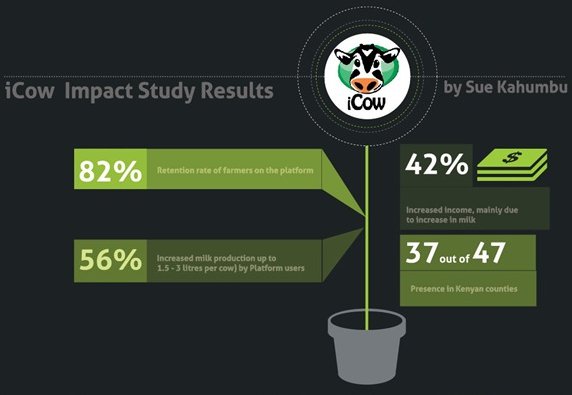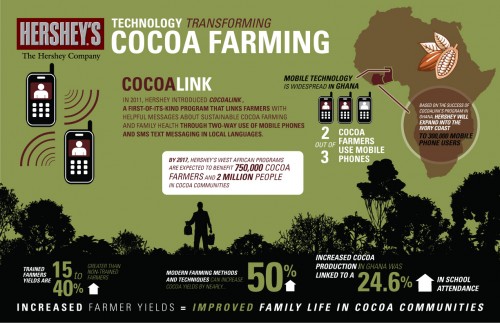List of African mobile agriculture services and applications
Nowadays, it is almost common knowledge that smartphones and apps have the potential to help farmers increase their yields and revenue. Mobile services (voice, SMS, simple data) are perfect for areas where infrastructure and financial limitations prevent broadband Internet. They are already playing a valuable role in African agricultural markets, in many cases only two years after introduction.
Of course, many farmers still lack access to these relatively new mobile opportunities. Expect that to rapidly change in the next few years as mobile costs are driven down, as governments create agricultural frameworks, and as private business realizes the tremendous opportunity at hand.
In honor of World Food Day, we’ve put together a list of how African developers, governments, and organizations operating in Africa are harnessing mobile technology to improve agricultural practices. Private companies, budding IT entrepreneurs, NGOs, as well as governments are all involved in a variety of mobile phone-based products, services, and applications aimed at boosting small-scale agriculture. Perhaps the apps out of Kenya (iCow and M-Farm) earn the most global recognition, but dozens of other projects are serving a similar need.
Kenya:
- iCow, the winning application in the Apps for Africa Competition 2010 allows small-scale dairy farmers to manage and trade livestock. The platform has allowed users to increase milk production by over 50% and income by 42%.
- M-Farm, a real-time group buying and selling market for farmers launched in 2010.
- Kilimo Salama enables smallholder farmers to insure their agricultural inputs against adverse weather conditions.
- KUZA Doctor, ‘a farmer’s mobile toolkit from farm to fork’, provides knowledge to farmers using SMS.
- SALI (Sustainable Agricultural Livelihood Innovation) done in Mbeere, Embu by Christian Aid, uses mobile phone technology to notify farmers of weather updates.
Burkina Faso:
- The 2012 ‘Week of the Internet‘ focused on the theme of “ICT and rural areas”. The Minister of Agriculture highlighted the benefits of ICT for agriculture, but implementation is still lacking.
Cameroon:
- Agro-Hub uses mobile technology to drive demand for farmers’ products, attract better prices, and increase farmers’ income.
East Africa:
- SANGONeT is involved with an application that allows small-scale dairy farmers in East Africa to record the lactation history of their cows.
Ghana:
- The Esoko service allows farmers access to market prices and allows them to place buy/sell orders.
- CocoaLink, launched by the Ghana Cocoa Board, Hershey, and World Cocoa Foundation, connects cocoa farmers with information about good farming practices. The free service uses SMS and voice.
- Farmers in the in the Eastern Corridor of the Northern Region are able to get better prices for their crops by using text messages thanks to the ECAMIC project.
- Ministry of Food and Agriculture (MoFA) launched a website in Accra to serve as a reference source for agricultural data and information.
Indian Ocean Islands:
- The launch of the online Indian Ocean Biodiversity & Agriculture portal hopes to improve environmental practices by agricultural communities.
Malawi:
- Through an ICT program, the government will issue e-vouchers to smallholder farmers in the hope of improving efficiency and effectiveness in the distribution of farm input. The vouchers will be electronically linked to a beneficiary and can only be used after verifying through Airtel network by an agro-dealer.
Niger:
- Grain traders with mobile application usage report 29% income growth. Demand for mobile grain price information has grown mostly organically. (World Bank ‘Maximising Mobile 2012’)
Rwanda:
- Ministry of Agriculture recently presented new mobile technology which informs Rwandans about price statuses.
Senegal:
- Manobi has a suite of mobile applications focused on agricultural market information.
Somalia:
- Humanitarian organization World Concern is piloting a new mobile phone app in the Horn of Africa, aiming to streamline the process of tracking food distributed to hungry families and payment to local merchants.
Tanzania:
- SEACOM has provided funding towards the development and piloting of a new Swahili and English language application for farmers in Tanzania.
- IBM, in a presentation to the government, has detailed a more automated and instantaneous framework in which farmers could use mobile phones to request and receive critical information via voice calls or text messages whenever needed
- Tanzanian farmers have started using smartphones to improve farming techniques through visual learning. (World Bank ‘Maximising Mobile 2012’)
Uganda:
- The micro-finance organization Grameen Foundation leases smartphones to local farmers so they can receive agricultural information. The information, in turn, is provided by Grameen to various organizations and food programs.
- Infotrade is a platform built to integrate collection, analysis and dissemination of agricultural and other market information.
- Women of Uganda Network (WOUGNET) aims at promoting and supporting the use of ICTs by women in Uganda. One of their projects known as “Enhancing Access to Agricultural Information (EAAI)” targets rural women farmers in Northern Uganda.
- The Mayuge Farmers Exchange provides farmers with access to email communication and information for learning best practice farming.
West Africa:
- In Senegal and Mali, the E-TIC portal and a series of training sessions destined for young people, women, and community radio journalists aims at sharing knowledge relevant for effective farm management.
Zambia:
- The Southern Africa Telecentre Network (SATNET) aims to give rural communities access to and training in how to use communication and information services. More than 30 telecentres are currently operational in the country.
- Zambia National Farmers Union promotes and protects the interest of members as farmers. Their website is very robust.
- LimaLinks is a market linkages system that links market agents and smallholder horticultural farmers across the Zambian Copper Belt. The program is operated by IDE Zambia and developed by SangoNet.
Zimbabwe:
- Zimbabweans can buy and sell cattle online thanks to the Remote Livestock Marketing System.
Africa-Wide:
- CountrySTAT, a web-based information technology system for food and agriculture statistics at the national and subnational levels has launched in at least 16 African nations.
- Coders4Africa, a non-profit, is developing partnerships with universities and organizations to develop SMS tools to address agriculture, among other needs.
Feel free to add to this list in the comments, as it is far from complete!














 Twitter
Twitter Facebook
Facebook Pinterest
Pinterest
my name is Omar from the Gambia. Am a farmer and intent to help farmers with farm input loans( seeds, fertilizer and agrochemicals) and capacity building with the use of mobile app to make life easier for them. I like your model and I want advice about it.! Because most the farmers can’t read or write so helping them with voice information will be very useful. Looking for advisors and partners. Thanks